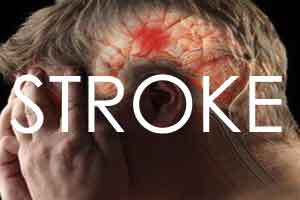- Home
- Editorial
- News
- Practice Guidelines
- Anesthesiology Guidelines
- Cancer Guidelines
- Cardiac Sciences Guidelines
- Critical Care Guidelines
- Dentistry Guidelines
- Dermatology Guidelines
- Diabetes and Endo Guidelines
- Diagnostics Guidelines
- ENT Guidelines
- Featured Practice Guidelines
- Gastroenterology Guidelines
- Geriatrics Guidelines
- Medicine Guidelines
- Nephrology Guidelines
- Neurosciences Guidelines
- Obs and Gynae Guidelines
- Ophthalmology Guidelines
- Orthopaedics Guidelines
- Paediatrics Guidelines
- Psychiatry Guidelines
- Pulmonology Guidelines
- Radiology Guidelines
- Surgery Guidelines
- Urology Guidelines
Biomarkers May Help Better Predict Who Will Have a Stroke

Minneapolis : People with high levels of four biomarkers in the blood may be more likely to develop a stroke than people with low levels of the biomarkers, according to a study published in the online issue of Neurology, the medical journal of the American Academy of Neurology.
“Identifying people who are at risk for stroke can help us determine who would benefit most from existing or new therapies to prevent stroke,” said study author Ashkan Shoamanesh, MD, of McMaster University in Hamilton, Canada, and a member of the American Academy of Neurology. “Future research could also investigate whether lowering the levels of these biomarkers or blocking their action could be a way to prevent strokes. However, our study does not provide evidence that these markers are validated well enough to be implemented in clinical practice.”
For the study, researchers from the Boston University Schools of Medicine and Public Health measured the levels of 15 biomarkers associated with inflammation in the blood of people from the Framingham Heart Study Offspring Cohort who had never had a stroke. The 3,224 participants were an average age of 61 at the start of the study and were followed for an average of nine years. During that time, 98 people had a stroke.
Of the 15 biomarkers, four were associated with an increased risk of stroke. People with elevated homocysteine were 32 percent more likely to have a stroke. Those with high vascular endothelial growth factor were 25 percent more likely; those with high ln-C reactive protein were 28 percent more likely; and those with high ln-tumor necrosis factor receptor 2 were 33 percent more likely to have a stroke during the study.
Adding these four biomarkers to an existing method of predicting a person’s stroke risk based on factors such as age, sex, cholesterol and blood pressure, called the Framingham Stroke Risk Profile, improved the ability to predict who would develop a stroke.
Shoamanesh noted that the study was observational. It shows a relationship between high levels of the biomarkers and stroke; it does not establish that the high levels cause stroke. He also noted that the biomarkers were measured only once and researchers did not account for infections, chronic diseases or other conditions that could have affected the results. In addition, study participants are mainly of European ancestry and the results may not apply to other populations.
The study was supported by Framingham Heart Study’s National Heart, Lung, and Blood Institute contract, National Institute of Neurological Disorders and Stroke, National Institute on Aging and National Institutes of Health.
The American Academy of Neurology is the world’s largest association of neurologists and neuroscience professionals, with 30,000 members. The AAN is dedicated to promoting the highest quality patient-centered neurologic care. A neurologist is a doctor with specialized training in diagnosing, treating and managing disorders of the brain and nervous system such as Alzheimer’s disease, stroke, migraine, multiple sclerosis, concussion, Parkinson’s disease and epilepsy.

Disclaimer: This site is primarily intended for healthcare professionals. Any content/information on this website does not replace the advice of medical and/or health professionals and should not be construed as medical/diagnostic advice/endorsement or prescription. Use of this site is subject to our terms of use, privacy policy, advertisement policy. © 2020 Minerva Medical Treatment Pvt Ltd